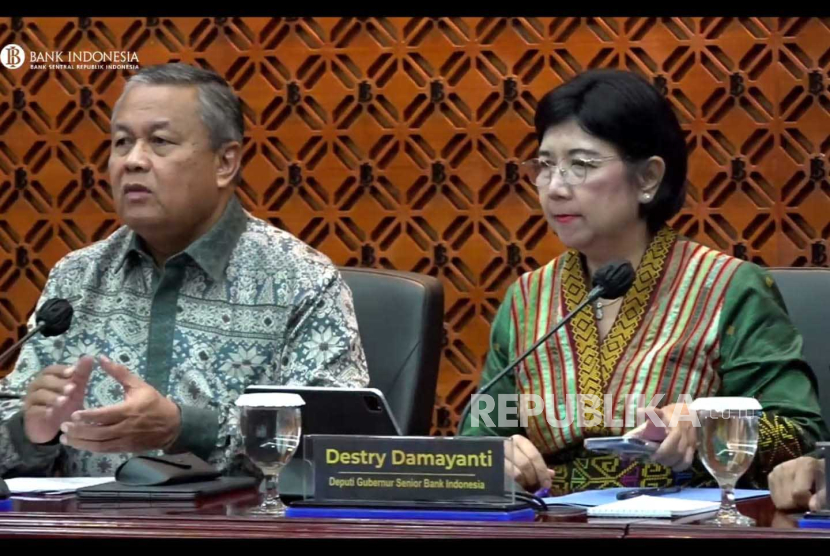REPUBLIKA.CO.ID, JAKARTA -- Indonesian central Bank, Bank Indonesia (BI), revealed today the US dollar continues to strengthen. It laid the plan of intervention in the foreign exchange market to stabilized rupiah.
“Compared to the end of 2022, the US dollar exchange rate index against major currencies (DXY) on October 18, 2023 was recorded as high at 106.21 or increased 2.60 percent year-to-date,” Perry said at the October 2023 RDG Monthly BI press conference on Thursday (10/19/2023).
At the close of trading yesterday, the rupiah weakened by 85 points or 0.54 percent to IDR 15.815 per US dollar from the previous close of IDR 15.730 per US dollar. Bank Indonesia's Jakarta Interbank Spot Dollar Rate (JISDOR) on Thursday also weakened to IDR 15.838 from the previous IDR 15.731 per US dollar.
He explained that the strength of the US dollar exerts pressure on the depreciation of the currencies of almost all the world's currencies. Perry cited the Japanese yen, Australian dollar and euro weakening 12.44 percent, 6.61 percent, and 1.40 percent, respectively, year-to-date.
Perry added that regional currencies such as the Malaysian ringgit, Thai baht, and Philippine peso were also depreciating 7.23 percent, 4.64 percent, and 1.73 percent year-to-date, respectively. In the same period, with stabilization measures taken by Bank Indonesia, Perry said the rupiah exchange rate depreciated by 1.03 percent.
“This is relatively better than the depreciation of currencies of a number of countries in the region and globally,” Perry said.
In line with the still high uncertainty of global financial markets, Perry ensured that Bank Indonesia continued to strengthen its policy of stabilizing the rupiah exchange rate. This is done to be in line with its fundamental values to support efforts to control imported inflation.
In addition to intervention in the foreign exchange market, Perry said, Bank Indonesia is accelerating efforts to deepen the rupiah money market and foreign exchange market. In addition, it also includes optimization of SRBI and issuance of other instruments to improve market mechanisms both in improving liquidity management of domestic financial institutions and attracting the influx of foreign portfolio flows from abroad.
“Coordination with the Government, banks, and the business world continues to be improved and expanded for the implementation of the Natural Resources Export Proceeds Foreign Exchange Placement Instrument (DHE SDA) in line with PP No. 36 of 2023,” Perry said.
Bank Woori Saudara (BWS) analyst Rully Nova said the weakness of the rupiah was influenced by an increase in US government bond yields and geopolitical risks of Palestinian struggle against Israel. “(Those geopolitical conditions present) the risk of rising inflation due to rising oil prices. As a result, investors will risk off by shifting investments to safe haven assets,” he said on Thursday (19/10/2023).
The 10-year U.S. government bond rose 4.9 basis points (bps) to 4.896 percent. On the other hand, the weaker rupiah was also affected by the increase in the BI-7 Day Reverse Repo Rate to 6 percent or by 0.25 basis points (bps) from 5.75 percent during the BI Board of Governors Meeting (RDG).
The deposit facility rate and the lending facility rate also rose by 0.25 bps sequentially to 5.25 percent and 6.75 percent, respectively. “Interest rates were raised to strengthen the stability of the rupiah exchange rate. The increase in interest rates will have a significant impact on capital outflow in Indonesia's financial markets,” Rully said.
According to Currency Market Analyst Lukman Leong, the rupiah weakened against a rebounding US dollar amid risk-off sentiment in the market due to hawkish statements from Fed officials Christopher J Waller and John Williams.
“Weller said the Fed will not raise interest rates at its November 2023 meeting, but could raise rates at the next meeting. Whereas Willliam sees Fed rates will remain high for a longer time,” he said.



